Unit 11 How was your school trip? Section B 2a-2c 课件(共33张PPT)
文档属性
| 名称 | Unit 11 How was your school trip? Section B 2a-2c 课件(共33张PPT) |
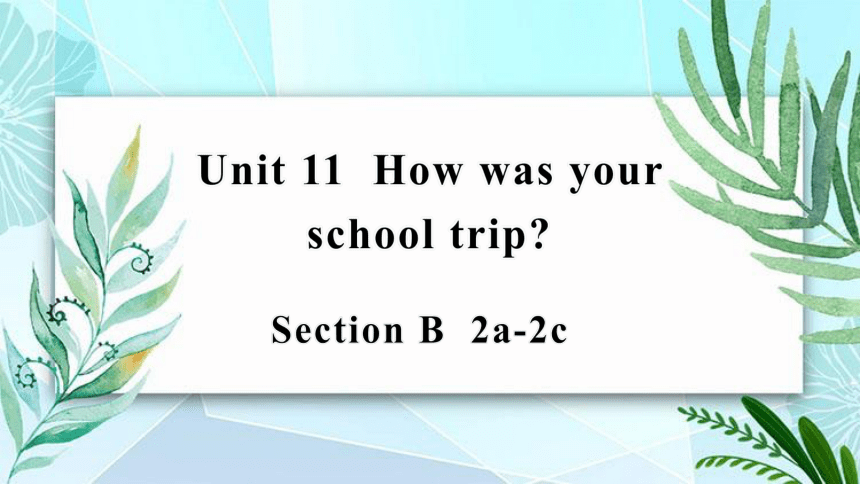
|
|
| 格式 | pptx | ||
| 文件大小 | 5.7MB | ||
| 资源类型 | 教案 | ||
| 版本资源 | 人教新目标(Go for it)版 | ||
| 科目 | 英语 | ||
| 更新时间 | 2023-05-20 00:00:00 | ||
图片预览

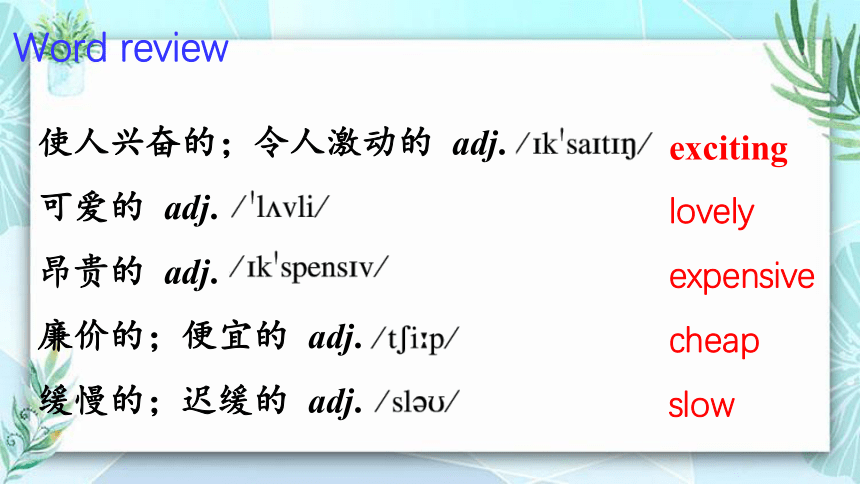
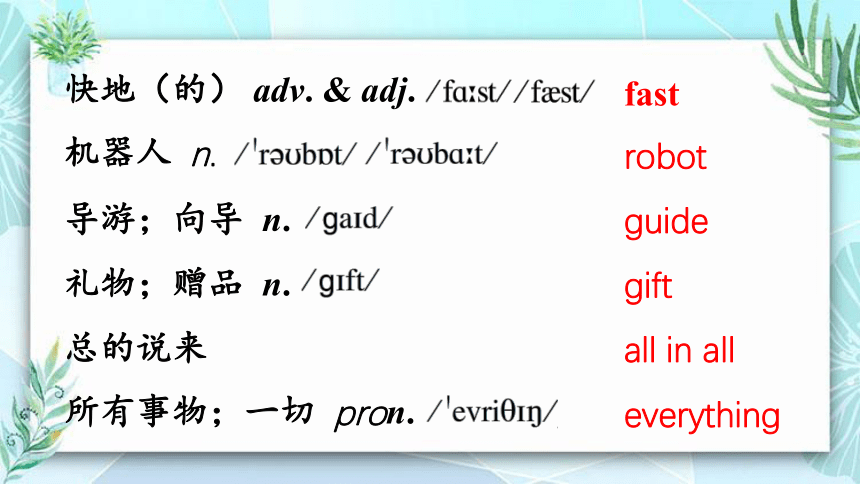
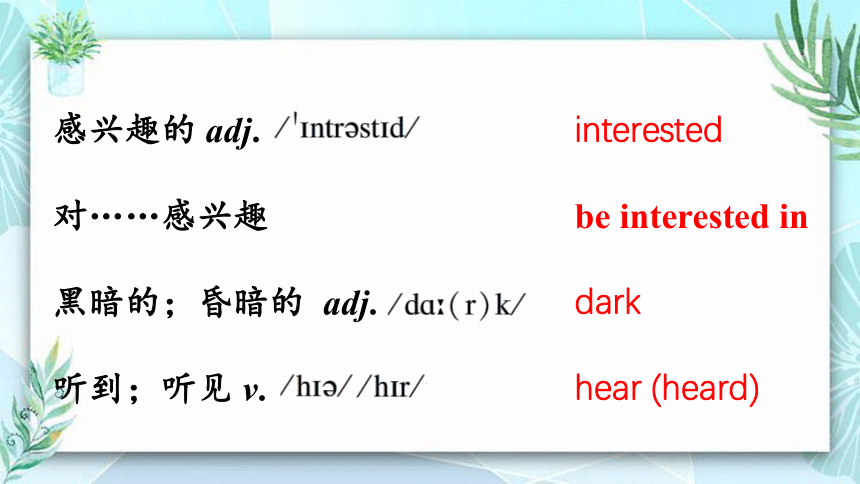

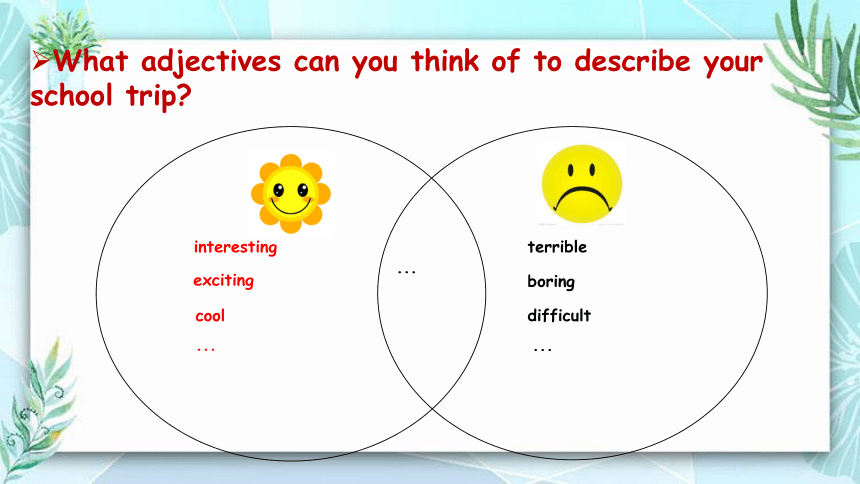
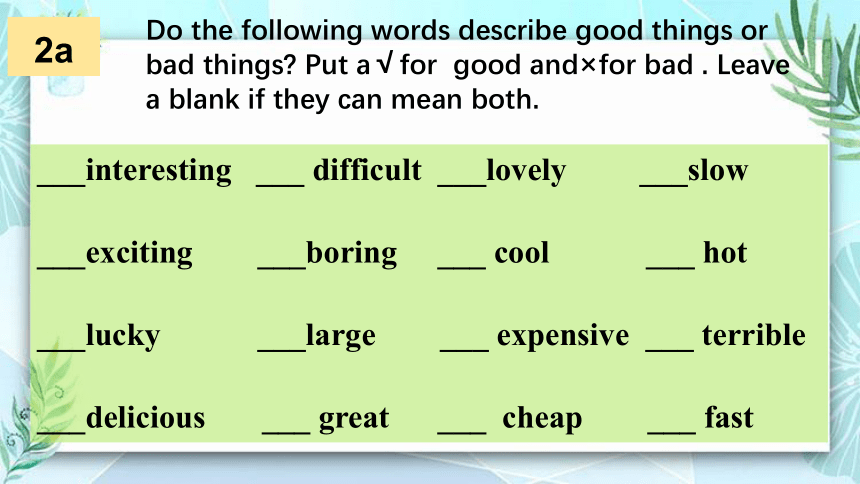

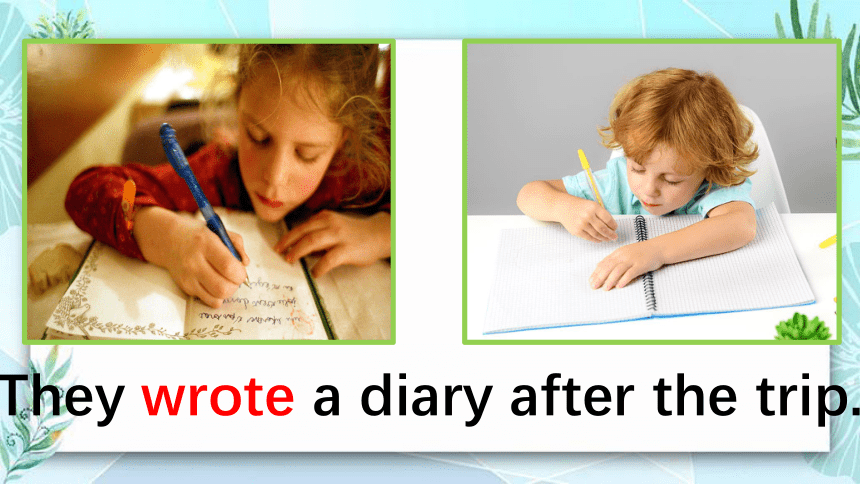
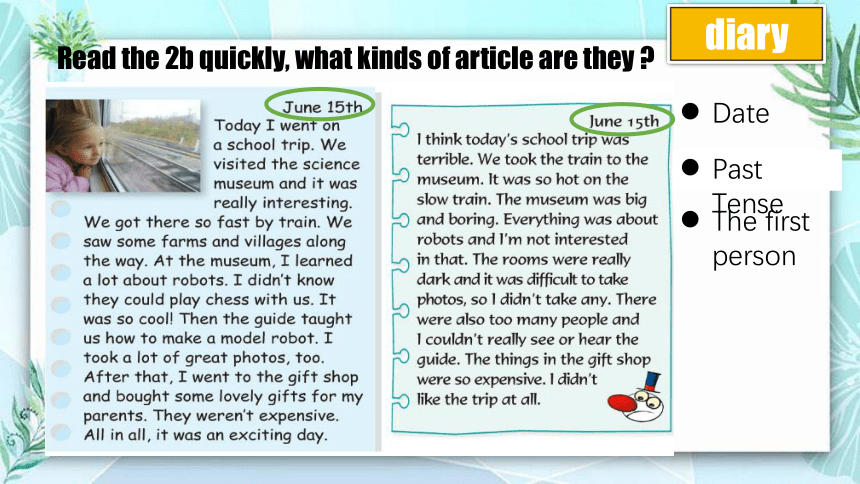
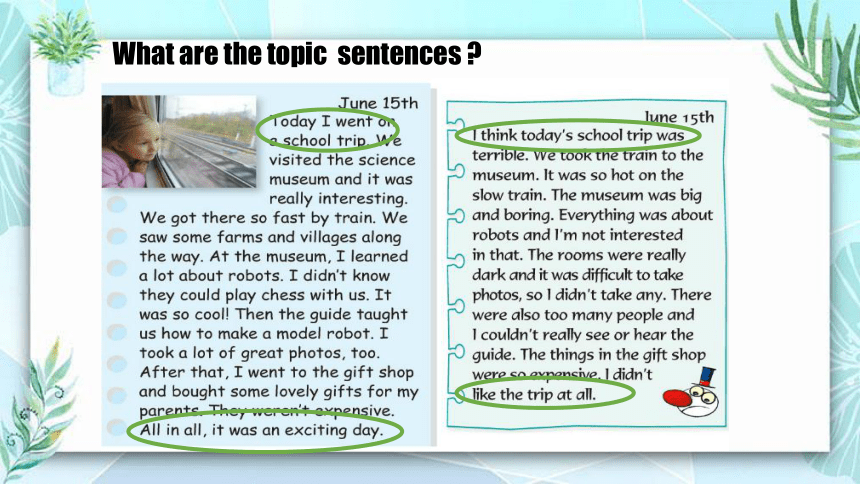
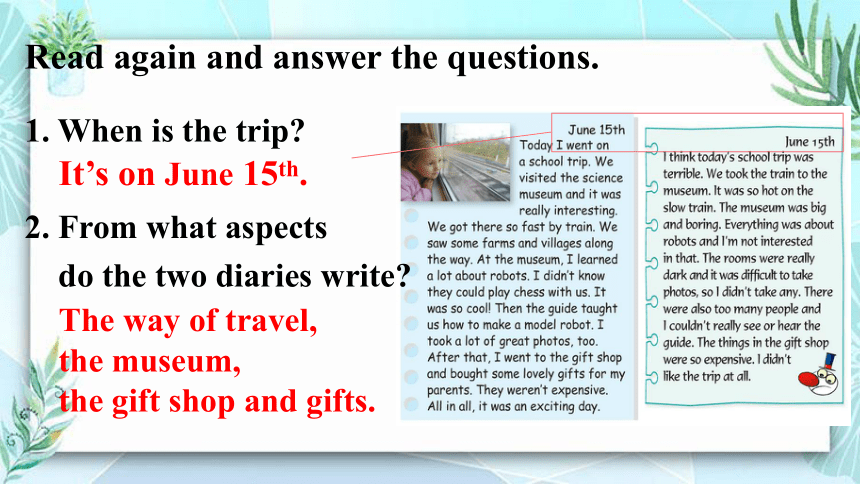
文档简介
(共33张PPT)
Section B 2a-2c
Unit 11 How was your school trip
Word review
使人兴奋的;令人激动的 adj.
可爱的 adj.
昂贵的 adj.
廉价的;便宜的 adj.
缓慢的;迟缓的 adj.
exciting
lovely
expensive
cheap
slow
快地(的) adv. & adj.
机器人 n.
导游;向导 n.
礼物;赠品 n.
总的说来
所有事物;一切 pron.
fast
robot
guide
gift
all in all
everything
感兴趣的 adj.
对……感兴趣
黑暗的;昏暗的 adj.
听到;听见 v.
interested
be interested in
dark
hear (heard)
Can you describe your last school trip
went to the countryside
climbed a mountain
went to an art museum
What adjectives can you think of to describe your school trip
interesting
exciting
cool
...
...
terrible
boring
difficult
...
Do the following words describe good things or
bad things Put a√for good and×for bad . Leave
a blank if they can mean both.
___interesting ___ difficult ___lovely ___slow
___exciting ___boring ___ cool ___ hot
___lucky ___large ___ expensive ___ terrible
___delicious ___ great ___ cheap ___ fast
2a
Helen
Jim
They took a school trip .
They wrote a diary after the trip.
Read the 2b quickly, what kinds of article are they
Date
diary
Past Tense
The first person
What are the topic sentences
Read again and answer the questions.
1. When is the trip
2. From what aspects
do the two diaries write
It’s on June 15th.
The way of travel,
the museum,
the gift shop and gifts.
1:Helen visited an science musuem.
careful reading
2:Helen got there so by train.
3:Helen bought some gifts.
The gifts were .
4:Helen’s school trip was .
interesting
fast
lovely
cheap
exciting
June 15th
Today I went on a school trip. We visited the science museum and it was
really interesting. We got there so fast by train. We saw some farms and villages along the way. At the museum, I learned a lot about robots. I didn’t know they could play chess with us. It was so cool! Then the guide taught us how to make a model robot. I took a lot of great photos, too. After that, I went to the gift shop and bought some lovely gifts for my parents. They weren’t expensive. All in all, it was an exciting day.
go on a trip 参加旅行 相当于have a trip
robot / r b t/ n. 机器人
/k d/ can的过去式
/ga d/ n. 导游;向导
/t t/ teach的过去式
/g ft/ n. 礼物;赠品
/b t/ buy的过去式
总的来说
careful reading
1:The train was and for Jim.
2:The museum was and .
The rooms were too to take photos.
3: Jim didn’t buy anything because he
thought the things were .
4: Jim thought the trip was .
hot
slow
big
boring
dark
expensive
terrible
June 15th
I think today’s school trip was terrible. We took the train to the museum. It was so hot on the slow train. The museum was big and boring. Everything was about robots and I’m not interested in that. The rooms were really dark and it was difficult to take photos, so I didn’t take any. There were also too many people and I couldn’t really see or hear the guide. The things in the gift shop were so expensive. I didn’t like the trip at all.
/ evriθ / pron. 所有事物;一切
be interested/ ntr rst d/ in 对 …… 感兴趣
/dɑ (r)k/ adj. 黑暗的;昏暗的 反义词为bright “光明的;明亮的”
/h / v. 听到;听见
not at all 一点也不
Read the diaries again and complete the chart.
How do Helen and Jim describe these things
Helen Jim
the trip
the train
the museum
the gift shop and gifts
exciting
terrible
so fast
so hot and slow
interesting
big,boring,dark
lovely, not
expensive.
so expensive
2c
Passage structure
Helen’s trip
Feelings
Activities
interesting, exciting
by train→saw→learned a lot→how to make a model robot→took a lot of great photos→went to the gift shop→bought some lovely gifts
Jim’s trip
Feelings
Activities
terrible, didn’t like the trip at all
took the train→not interested in robots→didn’t take any… →
couldn’t really see or hear the guide
Read and retell the passage below.
Helen and Jim went on a school trip to the ________
museum on June 15th. Helen thought it was __________and _________. The train was ______. She learned _______ about ________. She also took a lot of _______. She bought some ______ . They were _____ and cheap. However, Jim thought it was _______ . It was so hot on the ______train. The museum was big and
science
interesting
exciting
fast
a lot
robots
photos
gifts
lovely
terrible
slow
_______. He was not __________ in robots. The rooms were really ______ and it was _________to take photos, so he didn’t take any. There were ________ people and he couldn’t see or hear the guide. The things in the gift shop were so _________. So he didn’t like the trip at all.
boring
interested
dark
difficult
too many
expensive
Language points
1. exciting adj. 使人兴奋的;令人激动的
exciting “使人兴奋的;令人激动的”,常用于修饰物,表示事物本身让人兴奋、激动。
excited “感到兴奋的”,常用于修饰人,表示人的主观感受。
e.g. We are excited at the exciting news.
我们因为那个激动人心的消息而激动万分。
【易混辨析】exciting与excited
2. Then the guide taught us how to make a model robot. 然后,
导游教我们怎样制作机器人模型。
【句式剖析】本句中how to make a model robot为“特殊疑问词 + 动词不定式”结构,在句中看作一个整体,作taught的直接宾语。
Then the guide taught us (how to make a model robot).
↓
teach sb. sth.结构
guide n.导游;向导
3. All in all, it was an exciting day. 总的说来,这是令人兴奋的一天。
all in all 总的说来
【用法详解】all in all常放在句首,用来对之前所说的内容进行归纳或总结。意义及用法类似的短语有:in a word(总之), in short(简而言之)。
All in all/In a word/In short, this is a good book. 总的说来,这是一本好书。
4. Everything was about robots and I’m not interested in that. 一切
都是关于机器人的,我对那方面不感兴趣。
【用法详解】everything是不定代词,作主语时,谓语动词用第三人称单数形式。
Everything goes well. 一切进展顺利。
It’s very important to make a plan before we do everything. 我们在做所有事情之前先制订一个计划是非常重要的。
everything pron. 所有事物;一切
be interested in 对 …… 感兴趣
【用法详解】该结构中in为介词,其后接名词、代词或动词-ing形式作宾语。
He is interested in basketball. 他对篮球感兴趣。
Lisa is interested in singing and dancing. 莉萨对唱歌和跳舞感兴趣。
【拓展延伸】interest作名词,意为“兴趣;关注” ,have (an)
interest in sth. 表示“ 对......有兴趣”。
I have an interest in film music. 我对电影音乐感兴趣。
【易混辨析】 interesting与interested
interesting 意为"有趣的", 表示事物的性 质特征。 This is an interesting story. 这是一个有趣的故事。
interested 意为"感兴趣 的",表示人的 主观感受。 He is interested in music.
他对音乐感兴趣。
5. There were also too many people and I couldn’t really see or hear the guide. 而且人太多,我真的看不见导游,也听不清导游说什么。
hear v. 听到;听见
hear 及物动词 强调听的结果,其后直接接宾语。
listen 不及物动词 强调听的动作,其后跟宾语时要加介词to。
【易混辨析】hear与listen
6. I didn’t like the trip at all. 我一点儿都不喜欢这次旅行。
not…at all 一点儿也不
【用法详解】not…at all表示强烈的否定意味。
Tom doesn’t like dancing at all. 汤姆一点儿也不喜欢跳舞。
【拓展延伸】not at all的用法:
(1) 用来回答别人对你的感谢,意为“不客气,不用谢”。
—Thank you very much for lending me your bike.
非常感谢你借给我自行车。
—Not at all. 不客气。
(2) 用来回答别人的歉意,意为“没关系”。
—I’m sorry, Mom. I broke the glass.
对不起,妈妈。我打破了玻璃杯。
—Not at all. Be careful next time. 没关系。下次小心。
【课堂练习】
用所给单词的适当形式填空。
1. _______ you ______ (watch) TV yesterday
2. He ______ (play) tennis an hour ago.
3. Tom knew a lot about ______ (farm) in the village.
4. Sally _________ (not study) here last month.
5. She _____ (write) a new story yesterday.
6. She said she was _________ (interest) in art.
Did
watch
played
farmers
didn’t study
wrote
interested
根据汉语意思完成句子。
1. 导游教我们如何制作机器人模型。
Then the guide taught us ____ ____ ____ a model robot.
2.总的来说,我认为你干得很好。
______ ______ _____, I think you did a good job.
3.我一点也不喜欢这次旅游。
I ____ like the trip ____ ____.
how
to
make
All
in
all
didn’t
at
all
Man who travels far knows more.
Thank you!
Section B 2a-2c
Unit 11 How was your school trip
Word review
使人兴奋的;令人激动的 adj.
可爱的 adj.
昂贵的 adj.
廉价的;便宜的 adj.
缓慢的;迟缓的 adj.
exciting
lovely
expensive
cheap
slow
快地(的) adv. & adj.
机器人 n.
导游;向导 n.
礼物;赠品 n.
总的说来
所有事物;一切 pron.
fast
robot
guide
gift
all in all
everything
感兴趣的 adj.
对……感兴趣
黑暗的;昏暗的 adj.
听到;听见 v.
interested
be interested in
dark
hear (heard)
Can you describe your last school trip
went to the countryside
climbed a mountain
went to an art museum
What adjectives can you think of to describe your school trip
interesting
exciting
cool
...
...
terrible
boring
difficult
...
Do the following words describe good things or
bad things Put a√for good and×for bad . Leave
a blank if they can mean both.
___interesting ___ difficult ___lovely ___slow
___exciting ___boring ___ cool ___ hot
___lucky ___large ___ expensive ___ terrible
___delicious ___ great ___ cheap ___ fast
2a
Helen
Jim
They took a school trip .
They wrote a diary after the trip.
Read the 2b quickly, what kinds of article are they
Date
diary
Past Tense
The first person
What are the topic sentences
Read again and answer the questions.
1. When is the trip
2. From what aspects
do the two diaries write
It’s on June 15th.
The way of travel,
the museum,
the gift shop and gifts.
1:Helen visited an science musuem.
careful reading
2:Helen got there so by train.
3:Helen bought some gifts.
The gifts were .
4:Helen’s school trip was .
interesting
fast
lovely
cheap
exciting
June 15th
Today I went on a school trip. We visited the science museum and it was
really interesting. We got there so fast by train. We saw some farms and villages along the way. At the museum, I learned a lot about robots. I didn’t know they could play chess with us. It was so cool! Then the guide taught us how to make a model robot. I took a lot of great photos, too. After that, I went to the gift shop and bought some lovely gifts for my parents. They weren’t expensive. All in all, it was an exciting day.
go on a trip 参加旅行 相当于have a trip
robot / r b t/ n. 机器人
/k d/ can的过去式
/ga d/ n. 导游;向导
/t t/ teach的过去式
/g ft/ n. 礼物;赠品
/b t/ buy的过去式
总的来说
careful reading
1:The train was and for Jim.
2:The museum was and .
The rooms were too to take photos.
3: Jim didn’t buy anything because he
thought the things were .
4: Jim thought the trip was .
hot
slow
big
boring
dark
expensive
terrible
June 15th
I think today’s school trip was terrible. We took the train to the museum. It was so hot on the slow train. The museum was big and boring. Everything was about robots and I’m not interested in that. The rooms were really dark and it was difficult to take photos, so I didn’t take any. There were also too many people and I couldn’t really see or hear the guide. The things in the gift shop were so expensive. I didn’t like the trip at all.
/ evriθ / pron. 所有事物;一切
be interested/ ntr rst d/ in 对 …… 感兴趣
/dɑ (r)k/ adj. 黑暗的;昏暗的 反义词为bright “光明的;明亮的”
/h / v. 听到;听见
not at all 一点也不
Read the diaries again and complete the chart.
How do Helen and Jim describe these things
Helen Jim
the trip
the train
the museum
the gift shop and gifts
exciting
terrible
so fast
so hot and slow
interesting
big,boring,dark
lovely, not
expensive.
so expensive
2c
Passage structure
Helen’s trip
Feelings
Activities
interesting, exciting
by train→saw→learned a lot→how to make a model robot→took a lot of great photos→went to the gift shop→bought some lovely gifts
Jim’s trip
Feelings
Activities
terrible, didn’t like the trip at all
took the train→not interested in robots→didn’t take any… →
couldn’t really see or hear the guide
Read and retell the passage below.
Helen and Jim went on a school trip to the ________
museum on June 15th. Helen thought it was __________and _________. The train was ______. She learned _______ about ________. She also took a lot of _______. She bought some ______ . They were _____ and cheap. However, Jim thought it was _______ . It was so hot on the ______train. The museum was big and
science
interesting
exciting
fast
a lot
robots
photos
gifts
lovely
terrible
slow
_______. He was not __________ in robots. The rooms were really ______ and it was _________to take photos, so he didn’t take any. There were ________ people and he couldn’t see or hear the guide. The things in the gift shop were so _________. So he didn’t like the trip at all.
boring
interested
dark
difficult
too many
expensive
Language points
1. exciting adj. 使人兴奋的;令人激动的
exciting “使人兴奋的;令人激动的”,常用于修饰物,表示事物本身让人兴奋、激动。
excited “感到兴奋的”,常用于修饰人,表示人的主观感受。
e.g. We are excited at the exciting news.
我们因为那个激动人心的消息而激动万分。
【易混辨析】exciting与excited
2. Then the guide taught us how to make a model robot. 然后,
导游教我们怎样制作机器人模型。
【句式剖析】本句中how to make a model robot为“特殊疑问词 + 动词不定式”结构,在句中看作一个整体,作taught的直接宾语。
Then the guide taught us (how to make a model robot).
↓
teach sb. sth.结构
guide n.导游;向导
3. All in all, it was an exciting day. 总的说来,这是令人兴奋的一天。
all in all 总的说来
【用法详解】all in all常放在句首,用来对之前所说的内容进行归纳或总结。意义及用法类似的短语有:in a word(总之), in short(简而言之)。
All in all/In a word/In short, this is a good book. 总的说来,这是一本好书。
4. Everything was about robots and I’m not interested in that. 一切
都是关于机器人的,我对那方面不感兴趣。
【用法详解】everything是不定代词,作主语时,谓语动词用第三人称单数形式。
Everything goes well. 一切进展顺利。
It’s very important to make a plan before we do everything. 我们在做所有事情之前先制订一个计划是非常重要的。
everything pron. 所有事物;一切
be interested in 对 …… 感兴趣
【用法详解】该结构中in为介词,其后接名词、代词或动词-ing形式作宾语。
He is interested in basketball. 他对篮球感兴趣。
Lisa is interested in singing and dancing. 莉萨对唱歌和跳舞感兴趣。
【拓展延伸】interest作名词,意为“兴趣;关注” ,have (an)
interest in sth. 表示“ 对......有兴趣”。
I have an interest in film music. 我对电影音乐感兴趣。
【易混辨析】 interesting与interested
interesting 意为"有趣的", 表示事物的性 质特征。 This is an interesting story. 这是一个有趣的故事。
interested 意为"感兴趣 的",表示人的 主观感受。 He is interested in music.
他对音乐感兴趣。
5. There were also too many people and I couldn’t really see or hear the guide. 而且人太多,我真的看不见导游,也听不清导游说什么。
hear v. 听到;听见
hear 及物动词 强调听的结果,其后直接接宾语。
listen 不及物动词 强调听的动作,其后跟宾语时要加介词to。
【易混辨析】hear与listen
6. I didn’t like the trip at all. 我一点儿都不喜欢这次旅行。
not…at all 一点儿也不
【用法详解】not…at all表示强烈的否定意味。
Tom doesn’t like dancing at all. 汤姆一点儿也不喜欢跳舞。
【拓展延伸】not at all的用法:
(1) 用来回答别人对你的感谢,意为“不客气,不用谢”。
—Thank you very much for lending me your bike.
非常感谢你借给我自行车。
—Not at all. 不客气。
(2) 用来回答别人的歉意,意为“没关系”。
—I’m sorry, Mom. I broke the glass.
对不起,妈妈。我打破了玻璃杯。
—Not at all. Be careful next time. 没关系。下次小心。
【课堂练习】
用所给单词的适当形式填空。
1. _______ you ______ (watch) TV yesterday
2. He ______ (play) tennis an hour ago.
3. Tom knew a lot about ______ (farm) in the village.
4. Sally _________ (not study) here last month.
5. She _____ (write) a new story yesterday.
6. She said she was _________ (interest) in art.
Did
watch
played
farmers
didn’t study
wrote
interested
根据汉语意思完成句子。
1. 导游教我们如何制作机器人模型。
Then the guide taught us ____ ____ ____ a model robot.
2.总的来说,我认为你干得很好。
______ ______ _____, I think you did a good job.
3.我一点也不喜欢这次旅游。
I ____ like the trip ____ ____.
how
to
make
All
in
all
didn’t
at
all
Man who travels far knows more.
Thank you!
同课章节目录
- Unit 1 Can you play the guitar?
- Section A
- Section B
- Unit 2 What time do you go to school?
- Section A
- Section B
- Unit 3 How do you get to school?
- Section A
- Section B
- Unit 4 Don't eat in class.
- Section A
- Section B
- Unit 5 Why do you like pandas?
- Section A
- Section B
- Unit 6 I'm watching TV.
- Section A
- Section B
- Review of Units 1-6
- Unit 7 It's raining!
- Section A
- Section B
- Unit 8 Is there a post office near here?
- Section A
- Section B
- Unit 9 What does he look like?
- Section A
- Section B
- Unit 10 I'd like some noodles.
- Section A
- Section B
- Unit 11 How was your school trip?
- Section A
- Section B
- Unit 12 What did you do last weekend?
- Section A
- Section B
